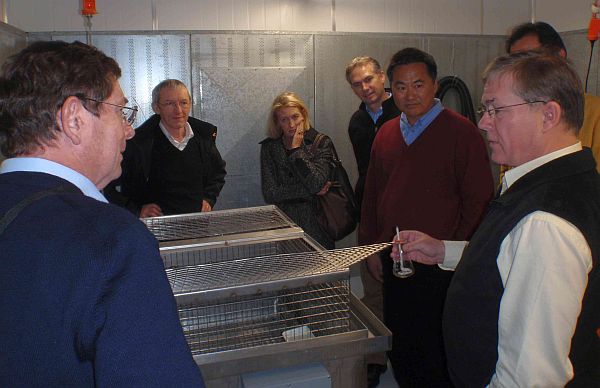Previous work done on Net Energy, namely Frap et al in 1940’s, has largely not been followed up in poultry. This has been primarily due to the practical challenges faced in setting up such facilities. However, with the ever increasing cost of feed, any gain in energy efficiencies or feed conversion efficiencies will pay direct dividends to industry says Professor Mingan Choct, CEO of the Poultry CRC. This is especially poignant in our current socio-economic climate, as we look to produce more from less, sustainably.
A current RIRDC project, jointly funded by CRC (sub-project 2.1.6) and Feedworks, in its early stages at UNE in Armidale, will enable researchers to measure and compare the net utilisation of dietary energy for growth, reproduction, and the maintenance of life functions in meat chickens. This shall be achieved using 24 specifically-built calorimetric chambers that, installed in an environment-controlled room, will be used to house chickens being fed a large number of diets containing a wide range of protein, lipid and fibre. Precise measurements of all energy input and output, including the production of heat during the digestion, absorption, and metabolism of nutrients will be achievable with this equipment.
“Interest in the possible implementation of a net energy system is very high within the industry” said Professor Choct. “Saving 10 grams of feed per kilogram of live weight means an annual saving of $4 million for the Australian chicken meat industry,” he explained. “If a net energy system is proven to be feasible, the potential gain in production efficiency is substantial.”
Using a net energy system for feed formulation has been successfully used in the pork industry in many parts of the world. Dr David Cadogan from Feedworks explains, “It does not give you an advantage every time, but overall it gives real benefit in cost of production most of the time, which is good enough for me”. In developing a net energy system in poultry, the project has attracted international interest and collaboration. Dr Jean Noblet, the director of nutrition and metabolism research within INRA, France’s National Institute for Agricultural Research, is a member of the project team. Dr Noblet, who is an international authority on net energy, will pay regular visits to UNE as part of his collaborative role.
“Currently in practical feed formulation for poultry, AME values obtained for individual ingredients are assumed to be additive, but in reality they are not,” explained Professor Choct. “A net energy system overcomes many of the shortcomings of the AME system. But it is obviously too early to say whether net energy is the answer. In a couple of years, this project will yield some answers ”.
If resulting commercial trials from this project are successful, an Australia-wide implementation of the net energy system will begin in consultation with the industry.


